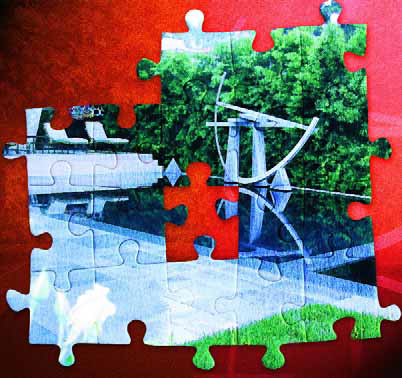Professional Watershaping
Something inspired and inspiring is happening in the watershaping industry - something I doubt has ever really happened before: In almost every encounter I have with industry people lately (and believe me, I've seen a lot of you in the past few months), I get the palpable sense of a passion that is driving all of us in a process of creative and professional growth. I see it in the enthusiasm my fellow watershapers have for what they're doing, and I see it being directly translated into their projects and, perhaps most important, being conveyed to their clients and the attitudes everyone has about the results. From where I sit, this is a spectacular time to be in this business, and that notion has been reinforced countless times in the recent past. I received a concentrated dose of this broad impression during the
Even though I've been on the leading edge of a movement for several years now, it still feels strange to put this thought on paper: A growing number of professionals like me are now finding work as consultants in the design and construction of watershapes. Who would ever have thought it possible? Just a few short years ago, the idea that anyone could make a living by charging for designs or construction oversight was outlandish and the subject of skepticism, shock and derision among architects, landscape architects and pool contractors. To that point, after all, "pool design" was generally a service that existed almost exclusively to support the sales efforts of contractors. These folks, who were accustomed to
Even though I've been on the leading edge of a movement for several years now, it still feels strange to put this thought on paper: A growing number of professionals like me are now finding work as consultants in the design and construction of watershapes. Who would ever have thought it possible? Just a few short years ago, the idea that anyone could make a living by charging for designs or construction oversight was outlandish and the subject of skepticism, shock and derision among architects, landscape architects and pool contractors. To that point, after all, "pool design" was generally a service that existed almost exclusively to support the sales efforts of contractors. These folks, who were accustomed to
As watershape designs become increasingly creative and complex, the demand for more precise methods of engineering their structures has grown as well. To meet that need, observe Ron Lacher and Aaron Cowen of Pool Engineering, experts like them are turning to advanced three-dimensional modeling technology - systems so sophisticated that they make it possible to develop plans for daring projects such as they one they describe here. It's easily the most sophisticated watershape structure we've ever engineered. The pool/spa combination, not yet built, will rise some 50 feet above grade on a cliff behind a home in the densely populated Hollywood Hills near downtown Los Angeles. As conceived, the vanishing-edge pool will sit a full ten feet below the spa in a complex monolithic structure. Supporting the entire affair will be
In the October 2005 issue of WaterShapes, I discussed a project that had tested my abilities and helped me to grow as a landscape designer. To that point in my career, I had functioned mainly as a designer focused on planting design. It was quite a step for me to accept the greater responsibility that came with a project that put me in charge of work on the total environment - pool, spa, deck, outdoor amenities and artwork placement as well as the planting plan. I knew going in that project management is a challenge no matter the size or scale of the job. Coordinating various trades, anticipating schedules and materials needs, making on-site design decisions and covering all
Robert Frost once wrote, "I took the road less traveled and that has made all the difference." As we approach the New Year, I can't think of a more fitting theme for the watershaping industry. If we consider where we were just ten years ago and compare that situation to the world in which we live and work today, it's clear that the industry as a whole has changed immeasurably - and, I think, for the good. I can say further and without fear of contradiction that those who have embraced the "road less traveled" and faced the future with creativity, hope and optimism have flourished, while those who have clung to the paradigms of the past are not so well positioned to
If there's one thought that permeates every page, every word and every photograph in this publication, it is this: The creation of something outstanding, something that stirs an emotional response, something that establishes an ongoing, extraordinary experience for clients and anyone else who sees our work all starts with the passion we have in our hearts for art and its intimate relationship to what we do as watershapers. That's a big concept. Really big. And I believe that unless you appreciate and (on some level) understand the raw power of artistic creation, then what you generate will seldom be
It'd be great if every project I was asked to tackle were about the complete environment - not only the planting plan, but also the watershapes, artworks, amenities and everything else a client might desire. That doesn't happen often enough, probably because my portfolio is much richer in planting plans than it is in watershapes. But from time to time I find clients who have faith in me and my abilities as a designer and give me total control. Late last year, I was fortunate enough to come across one such project. I had originally been brought in to
Through the years, more than a few watershaping professionals have asked me how to break through and start working with high-end clients. I respond by giving them the disappointing news that there is no magic key here: Serving the high end takes commitment, hard work and a willingness to focus your thinking on a distinct set of fundamentals that must take over and guide your work. Depending on the level at which you're currently functioning, getting to the high end may involve climbing a mountain or might simply be about making a series of
I've always been puzzled by people who look at money as a taboo topic. Within any form of business, of course, competitors are restricted by federal anti-trust laws from getting specific in discussions of pricing, overhead and profit margins. But it's always seemed to me that understanding those factors in broad, general terms (which are legally discussable, by the way) is at the core of the success of any business - especially in the world of contracting. The reason pricing, overhead and margins are so critical is that they reflect your core values and those of your company with respect to both money and overall business philosophy. It's my informed view that too many contractors severely





















